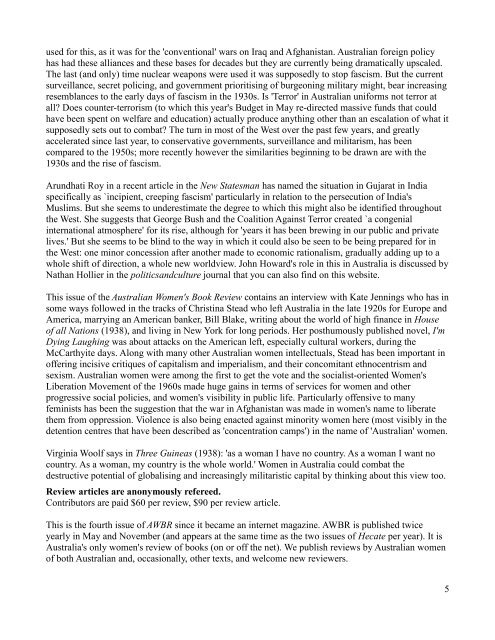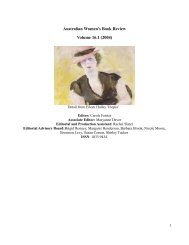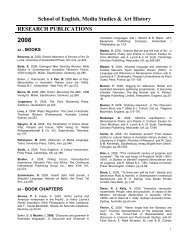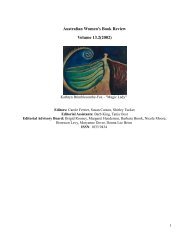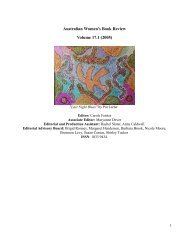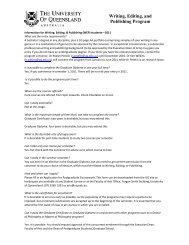Australian Women's Book Review Volume 14.1 - School of English ...
Australian Women's Book Review Volume 14.1 - School of English ...
Australian Women's Book Review Volume 14.1 - School of English ...
Create successful ePaper yourself
Turn your PDF publications into a flip-book with our unique Google optimized e-Paper software.
used for this, as it was for the 'conventional' wars on Iraq and Afghanistan. <strong>Australian</strong> foreign policy<br />
has had these alliances and these bases for decades but they are currently being dramatically upscaled.<br />
The last (and only) time nuclear weapons were used it was supposedly to stop fascism. But the current<br />
surveillance, secret policing, and government prioritising <strong>of</strong> burgeoning military might, bear increasing<br />
resemblances to the early days <strong>of</strong> fascism in the 1930s. Is 'Terror' in <strong>Australian</strong> uniforms not terror at<br />
all? Does counter-terrorism (to which this year's Budget in May re-directed massive funds that could<br />
have been spent on welfare and education) actually produce anything other than an escalation <strong>of</strong> what it<br />
supposedly sets out to combat? The turn in most <strong>of</strong> the West over the past few years, and greatly<br />
accelerated since last year, to conservative governments, surveillance and militarism, has been<br />
compared to the 1950s; more recently however the similarities beginning to be drawn are with the<br />
1930s and the rise <strong>of</strong> fascism.<br />
Arundhati Roy in a recent article in the New Statesman has named the situation in Gujarat in India<br />
specifically as `incipient, creeping fascism' particularly in relation to the persecution <strong>of</strong> India's<br />
Muslims. But she seems to underestimate the degree to which this might also be identified throughout<br />
the West. She suggests that George Bush and the Coalition Against Terror created `a congenial<br />
international atmosphere' for its rise, although for 'years it has been brewing in our public and private<br />
lives.' But she seems to be blind to the way in which it could also be seen to be being prepared for in<br />
the West: one minor concession after another made to economic rationalism, gradually adding up to a<br />
whole shift <strong>of</strong> direction, a whole new worldview. John Howard's role in this in Australia is discussed by<br />
Nathan Hollier in the politicsandculture journal that you can also find on this website.<br />
This issue <strong>of</strong> the <strong>Australian</strong> <strong>Women's</strong> <strong>Book</strong> <strong>Review</strong> contains an interview with Kate Jennings who has in<br />
some ways followed in the tracks <strong>of</strong> Christina Stead who left Australia in the late 1920s for Europe and<br />
America, marrying an American banker, Bill Blake, writing about the world <strong>of</strong> high finance in House<br />
<strong>of</strong> all Nations (1938), and living in New York for long periods. Her posthumously published novel, I'm<br />
Dying Laughing was about attacks on the American left, especially cultural workers, during the<br />
McCarthyite days. Along with many other <strong>Australian</strong> women intellectuals, Stead has been important in<br />
<strong>of</strong>fering incisive critiques <strong>of</strong> capitalism and imperialism, and their concomitant ethnocentrism and<br />
sexism. <strong>Australian</strong> women were among the first to get the vote and the socialist-oriented <strong>Women's</strong><br />
Liberation Movement <strong>of</strong> the 1960s made huge gains in terms <strong>of</strong> services for women and other<br />
progressive social policies, and women's visibility in public life. Particularly <strong>of</strong>fensive to many<br />
feminists has been the suggestion that the war in Afghanistan was made in women's name to liberate<br />
them from oppression. Violence is also being enacted against minority women here (most visibly in the<br />
detention centres that have been described as 'concentration camps') in the name <strong>of</strong> '<strong>Australian</strong>' women.<br />
Virginia Woolf says in Three Guineas (1938): 'as a woman I have no country. As a woman I want no<br />
country. As a woman, my country is the whole world.' Women in Australia could combat the<br />
destructive potential <strong>of</strong> globalising and increasingly militaristic capital by thinking about this view too.<br />
<strong>Review</strong> articles are anonymously refereed.<br />
Contributors are paid $60 per review, $90 per review article.<br />
This is the fourth issue <strong>of</strong> AWBR since it became an internet magazine. AWBR is published twice<br />
yearly in May and November (and appears at the same time as the two issues <strong>of</strong> Hecate per year). It is<br />
Australia's only women's review <strong>of</strong> books (on or <strong>of</strong>f the net). We publish reviews by <strong>Australian</strong> women<br />
<strong>of</strong> both <strong>Australian</strong> and, occasionally, other texts, and welcome new reviewers.<br />
5


